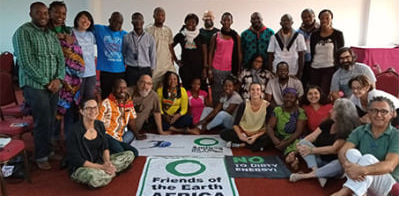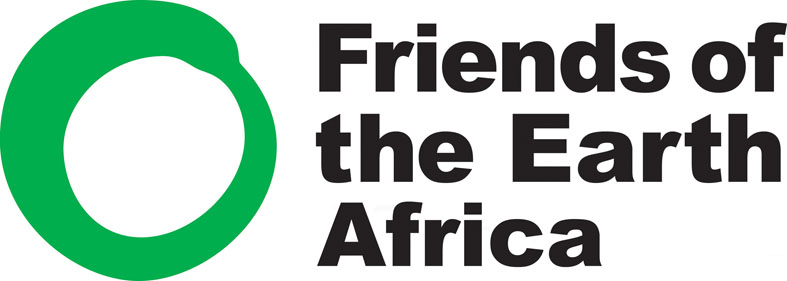
The regional body, Friends of the Earth Africa (FoEA) is a collective of 11 sovereign national-level organizations working with grassroots communities on environmental and rights-based struggles in Africa. We build people’s power towards a common African agenda for environmental, economic, gender, and social justice free from all forms of domination and exploitation, such as neoliberalism, corporate globalization, neo-colonialism, and militarism.
The national groups of FoEA are part of the 70-country groups that make up Friends of the Earth International.
As a collective, we envision a peaceful and sustainable world based on societies living in harmony with nature; interdependent societies where people live in dignity, wholeness, and fulfillment, in which equity and human and peoples’ rights are realized. Our work involves rejecting false solutions and false narratives of development that cause more harm to communities and society than their supposed benefits. We tirelessly work to build this society upon peoples’ sovereignty and participation. We strongly believe that our world today and the future of our children will be better because of what we do.
Reacting to a grave accusation by the Flacoius report published by the Africa Energy Chamber on the 16th of May 2024, we understand that our work to support peoples and the planet is threatening to entities like the Energy Chamber that are constantly acting against these interests. We are the ones who constantly fight for peoples’ sovereignty and progress for the poorest and most vulnerable. Three of our colleagues from Friends of the Earth France and Action Justice Climat who are standing in solidarity with the peoples of Africa fighting against the creation of more sacrifice zones through the EACOP project on the continent, staged a nonviolent action at the close of the “Invest in African Energy Forum” in Paris. The activist who managed to get inside the meeting room, hid small sound alarms in the room, (alarms normally used for self-defense), activated the alarms, and simply stayed in the room handcuffed to a chair, with a T-shirt saying “Total, Perenco, Stop prédation fossile“. The action was targeted at TotalEnergies the first oil and gas company in the world to develop new extraction projects on the African continent and responsible for more than 14% of the short-term oil and gas expansion there[1] and Perenco, whose oil extraction projects are causing serious environmental damages in DRC.
The fossil fuel lobby on the African continent is merely playing the role of comprador, facilitating extraction from Africa for the benefit of imperial powers and African and global elites. Energy poverty eradication is mere lip service. We need look no further than oil extraction in Angola and Nigeria, gas in Mozambique, and coal in South Africa. The poor get it in the neck as energy poverty increases with more fossil fuel extracted, says Bobby Peek, Executive Director of groundWork, Friends of the Earth South Africa.
For over 6 decades since fossil fuels have been extracted from different parts of the African continent mostly for export to serve the countries of the global north, the “rewards” for the people of this continent have been still over 600 million Africans without energy, severe environmental degradation to land and water, with oil pollution, gas flares, negative health impacts, land grabs, mass livelihood losses, insecurity, militarization and inflicted conflicts over limited resources.
‘The majority of Africans’ clean energy and poverty eradication aspirations will not be served by crude oil export pipelines like the EACOP. Inclusive, community-owned clean energy projects that emphasize economic transformation for the most vulnerable will. The Africa Energy Chamber errs in arguing that fossil fuel projects and export crude oil pipelines serve Africans’ interests.’ says Diana Nabiruma, Senior Communicator at Africa Institute for Energy Governance (AFIEGO) Uganda and ally of Friends of the Earth.
We as Friends of the Earth Africa have published several reports highlighting these negative impacts on nature and peoples. But beyond these reports, we work with grassroots communities to campaign, mobilize, and resist all forms of oppression while proffering solutions to the energy poverty and just energy transition pathway the world is currently on.
Of note is the Just Recovery Renewable Energy Plan for Africa, and Don’t Let Africa Burn. In these documents, we suggest pathways our governments can take to lift our peoples out of energy poverty, create over 7 million jobs, and justly transition to a people-centered, people-led, clean, renewable energy era that does not include ‘gas as a transition fuel’ or investment in environmentally and socially degrading oil extraction.
Just this year, the peoples of Mozambique, Kenya, and many East African countries suffered from deadly climate change impacts – floods, drought, hurricanes, and typhoons – all linked to the continued extraction and burning of fossil fuels. All of which are direct impacts of climate change.
Lest we forget, the Intergovernmental Panel on Climate Change’s (IPCC) Sixth Assessment Report (AR6) warned that there is a 50% chance that the rise in global temperatures will reach or surpass 1.5 degrees Celsius above pre-industrial levels between 2021 and 2040 across studied scenarios, and under a high-emissions pathway. An average global temperature increase in such a carbon-intensive scenario could also rise from 3.3 degrees C to 5.7 degrees C by 2100. What this means for vulnerable countries in the global south is that there would be more climate disasters and burning of people and places in Africa. It also suggests that the risks of inaction on climate are immense and the way ahead requires an end to the extraction and burning of fossil fuels at a scale not seen before. It said that limiting the global temperature increase to 1.5 degrees C is still possible, but only if we act immediately.[1]
Anabela Lemos of Justiça Ambiental, (Friends of the Earth Mozambique) JA! On community struggles with gas expansion projects in Mozambique
It is an illusion to think that exploring fossil fuels on the African continent will bring energy or development to the people. Mozambique is a clear example of this illusion, with the exploitation of Coal in Tete, the Gas in Inhambane and Cabo Delgado only 40% of the people have access to energy. The other benefits from these projects have been misfortune, loss of land, pollution, increased corruption, human rights violations, instability, war/ insurgency, and the constantly shrinking civil society space. Suppose these projects can deliver any “development” to the countries where they are or will be sited. In that case, it will not even cover the cost of the ongoing impacts of climate change that many of us are already going through but worsen the reality of the increase in greenhouse gas emissions.
At this stage of the energy transition, African leaders should prioritize demanding the payment of ecological debts owed to the region for years of robbing by those responsible for the climate crisis as grants, not loans. They should be demanding these funds to ease our transition towards clean socially-owned renewables, aid adaptation, and mitigation, and not explore/exploit gas as a transition fuel.
We ask who will suffer the consequences of continued exploitation of fossil fuels and also live with the stranded fossil fuels infrastructural assets. It is the most vulnerable. Our leaders should be demanding the transfer of relevant technology for the peoples of Africa. The energy transition we seek for the people of Africa is based on their sovereignty, one led by the people, and one where the people own and control the energy.
[1] https://www.wri.org/insights/2023-ipcc-ar6-synthesis-report-climate-change-findings#:~:text=The%20IPCC%20finds%20that%20there,sooner%20%E2%80%94%20between%202018%20and%202037.
[1] https://www.amisdelaterre.org/publication/who-is-financing-fossil-fuel-expansion-in-africa/
